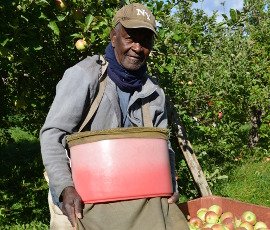Submitted By: Natalie Kivell

Who are Migrant Workers?
Migrant workers (MW), who are mainly low-wage workers, are recruited from Mexico, Central America, and the Caribbean to work in Canada 6 weeks to 8 months out of the year on farms, in other low-wage sectors, and as live-in caregivers. There are approximately 25,000 MWs working just on farms in Ontario each year. Migrant workers have some of the same rights and protections as Canadian workers, but differ in some important ways. First, migrant workers have ‘tied work permits’, meaning that their work visa is tied to their place of employment, restricting their ability to move jobs and increasing their potential for being exploited, abused, and/or becoming a victim of human trafficking. Migrant workers have little recourse against employers when facing exploitation or abuse, and many times are deported before they can address their complaint. Migrant workers have limited access to Canadian institutions and are limited in their access to CPP, EI, and other benefits even though they pay into the system in the same way as other Canadian workers, some for decades of their working lives.
Migrant Workers in Grey-Bruce
For many in Grey and Bruce Counties, MW’s may appear to be a transient community; a separate community; a community of workers who are here only a few months out of the year and then return to their home country; a group of workers who ride their bicycles (if they have access to one) to the grocery store or to the thrift shop in town once a week for provisions, but who otherwise remain invisible.
What many of us do not know is that these workers are a part of our community, a part of our county. Migrant workers hold full-time jobs in our county (and generally hold jobs that local workers do not want, working seven days a week for wages that local workers would not accept). Migrant workers make our local food system possible. Migrant workers pay into EI and CPP. Many migrant workers return year after year, resulting in them spending more of their lives here in Grey and Bruce County than in their own countries or home communities. Migrant workers are an integral part of the fabric of our community. All of that said, migrant workers are at a much higher risk of being exploited, to experience wage theft and/or to be victims of human trafficking than Canadian workers.
Supporting Migrant Workers in Grey-Bruce: What we want to do!
A group of dedicated folks at the Grey Bruce Community Legal Clinic (GBCLC) in Owen Sound, led by Dr. Natalie Kivell, want to ensure that our community of service providers and all migrant workers in Grey-Bruce are aware of their rights and understand where and how to access the legal services they may need.
The GBCLC is looking to connect with organizations, community groups, service providers, farmers, and community members who are connected to migrant workers in the county and connect to migrant workers directly.
Our Ask
Are you a migrant worker? Do you work for an organization providing service for migrant workers? Are you a community member connected to migrant workers in Grey or Bruce County? If you said yes to any of the above, the GBCLC would like to connect with you.
-
First, to better understand how large our migrant worker community is and what the specific local needs are,
-
Second, to build partners with community organizations to help develop and disseminate legal training for service providers in the region, and
-
Third, to help build direct relationships with and between migrant workers and support the integration of this group of local workers into our Grey and Bruce County community.
If you are interested in, or are already, supporting and engaged with local migrant workers please email Natalie Kivell at nataliemkivell@gmail.com.
Photo: Helen Solmes










